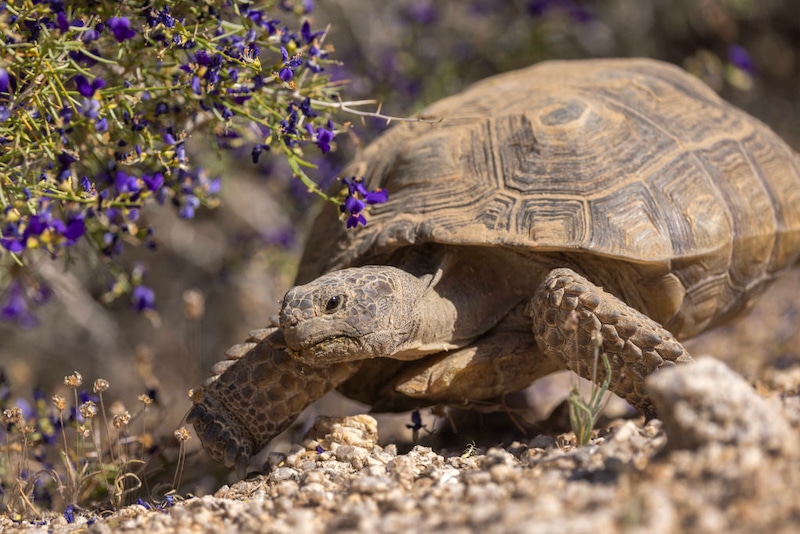Joshua trees such as this 25-foot tall specimen approximately 150-200 years old are threatened with removal because of the Aratina solar project, pictured in Boron, California on May 30, 2024. Myung J. Chun / Los Angeles Times via Getty Images
 Why you can trust us
Why you can trust us
Founded in 2005 as an Ohio-based environmental newspaper, EcoWatch is a digital platform dedicated to publishing quality, science-based content on environmental issues, causes, and solutions.
A new solar power project that will break ground in the Mojave Desert, near two Kern County towns in California, will require thousands of Joshua trees (Yucca brevifolia) to be removed. The project is also expected to destroy a habitat for desert tortoises (Gopherus agassizii), California’s state reptile and a threatened species.

The Aratina Solar Center project, developed by Avantus, is slated to span 2,300 acres in Boron, California and has already been revised once due to local complaints. According to the project website, the solar power site was redesigned to be better disguised from local residents.
But locals are still concerned about how this project can affect Boron and another nearby town, Desert Lake, in addition to the environmental impacts.
A study on the project highlighted that the area’s soil contains fungal pathogens that can cause valley fever, and now, residents are concerned about how construction could spread these pathogens and other particulate matter by stirring up dust into the air.
“How are kids going to be able to play outside?” Melanie Richardson, a local resident and nurse who has children that attend nearby schools, told the Los Angeles Times. “So many people from our community were begging them not to approve this project, and they passed it regardless.”
The clean energy project, which is expected to power 180,000 homes — with that power estimated to be for wealthy residents along the coast, the Los Angeles Times reported — could also have lasting impacts on the desert ecosystem.
Landscape clearing is expected to begin today, June 3, according to an anonymous source that shared information with the Los Angeles Times. There are 4,722 Joshua trees on the planned project site that could be removed.
According to the project website, Avantus said the new solar project will “offset about 860,000 metric tons of carbon emissions every year, the annual equivalent to planting 14 million trees.” Kern County officials also told the Los Angeles Times that Avantus provided $1.4 million in funding for Joshua tree protections in areas outside of their development site.
More From EcoWatch
Although petitions to protect Joshua trees under the Endangered Species Act in recent years have failed, the plants do have some protections under the Western Joshua Tree Conservation Act, which took effect in July 2023. As the Los Angeles Times reported, the solar project was approved before the act took effect.
The desert tortoises, which are the California state reptile, have declined in population in the state by about 50% over the past 20 years, are considered threatened both by the state and under the federal Endangered Species Act. The species is listed as critically endangered under the International Union for Conservation of Nature’s Red List. The project is also expected to impact Mojave ground squirrels (Xerospermophilus mohavensis), a threatened species under the California Endangered Species Act.
However, Kern County officials unanimously approved the new Aratina Solar Center, citing modifications, such as halting construction in the presence of desert tortoises and constructing temporary tortoise-proof fencing around the construction site, that would make any environmental impacts “less than significant,” according to the county’s Final Environmental Impact Report, which also addressed public comments concerned about the project.
[embedded content]
Subscribe to get exclusive updates in our daily newsletter!
By signing up, you agree to the Terms of Use and Privacy Policy & to receive electronic communications from EcoWatch Media Group, which may include marketing promotions, advertisements and sponsored content.
Based in Los Angeles, Paige is a writer who is passionate about sustainability. She earned her Bachelor’s degree in Journalism from Ohio University and holds a certificate in Women’s, Gender and Sexuality Studies. She also specialized in sustainable agriculture while pursuing her undergraduate degree.
- SEO Powered Content & PR Distribution. Get Amplified Today.
- PlatoData.Network Vertical Generative Ai. Empower Yourself. Access Here.
- PlatoAiStream. Web3 Intelligence. Knowledge Amplified. Access Here.
- PlatoESG. Carbon, CleanTech, Energy, Environment, Solar, Waste Management. Access Here.
- PlatoHealth. Biotech and Clinical Trials Intelligence. Access Here.
- Source: https://www.ecowatch.com/solar-project-mojave-desert-joshua-trees-tortoises.html
